Embarking on the journey to parenthood through surrogacy is an exciting and transformative experience. While the path to parenthood via a surrogate can be immensely rewarding, it also comes with its own set of challenges, emotional highs and lows, and an entirely new set of responsibilities. As intended parents, preparation is key to navigating this process smoothly, ensuring that both your emotional well-being and your practical needs are addressed.
This guide offers practical tips to help intended parents prepare for parenthood through surrogacy, from understanding the steps involved to managing expectations and nurturing relationships with the surrogate.
1. Understand the Surrogacy Process
Surrogacy can be a complex legal and medical process, and the more informed you are, the better prepared you will be. Before you begin the journey, take the time to educate yourself on every aspect of the process.
What to Do:
- Research the Legal Requirements: Surrogacy laws vary by state and country. Make sure you understand the legal framework of surrogacy in your jurisdiction and what steps need to be taken to ensure that you are legally recognized as the child’s parents. This includes establishing parental rights, creating contracts, and understanding any potential legal complications.
- Learn About IVF and Embryo Transfer: In most surrogacy arrangements, in vitro fertilization (IVF) is used to create embryos. Understand how IVF works and the medical processes involved, including egg retrieval, fertilization, embryo culture, and embryo transfer.
- Consult with a Fertility Specialist: Meet with a fertility specialist to discuss the process and any medical considerations specific to your situation. They can provide you with details on egg retrieval, sperm analysis, embryo screening, and other fertility-related concerns.
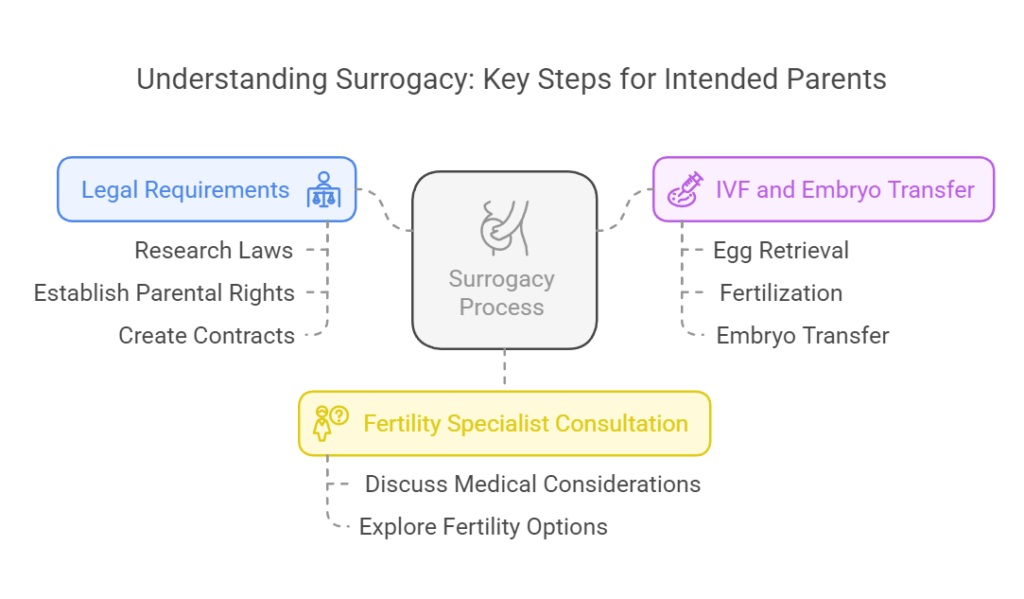
2. Select the Right Surrogacy Agency
If you choose to work with a surrogacy agency, selecting the right one is a crucial step. A reputable agency can offer guidance and support through every phase of the surrogacy process, including matching you with a surrogate, providing medical referrals, handling legal issues, and offering emotional support.
What to Do:
- Choose an Experienced Agency: Research surrogacy agencies with a solid track record of successful placements and positive testimonials. Look for agencies that are transparent about their process and that offer support for both intended parents and surrogates.
- Understand the Agency’s Role: Agencies handle different aspects of the process. Some provide full-service surrogacy, including matching, legal, and medical services, while others may offer more limited services. Ensure that the agency’s offerings match your needs.
- Ask About Support Services: A good agency should offer counseling and support for intended parents and surrogates throughout the journey. Surrogacy can be emotionally complex, and it’s important to have access to professionals who can guide you.
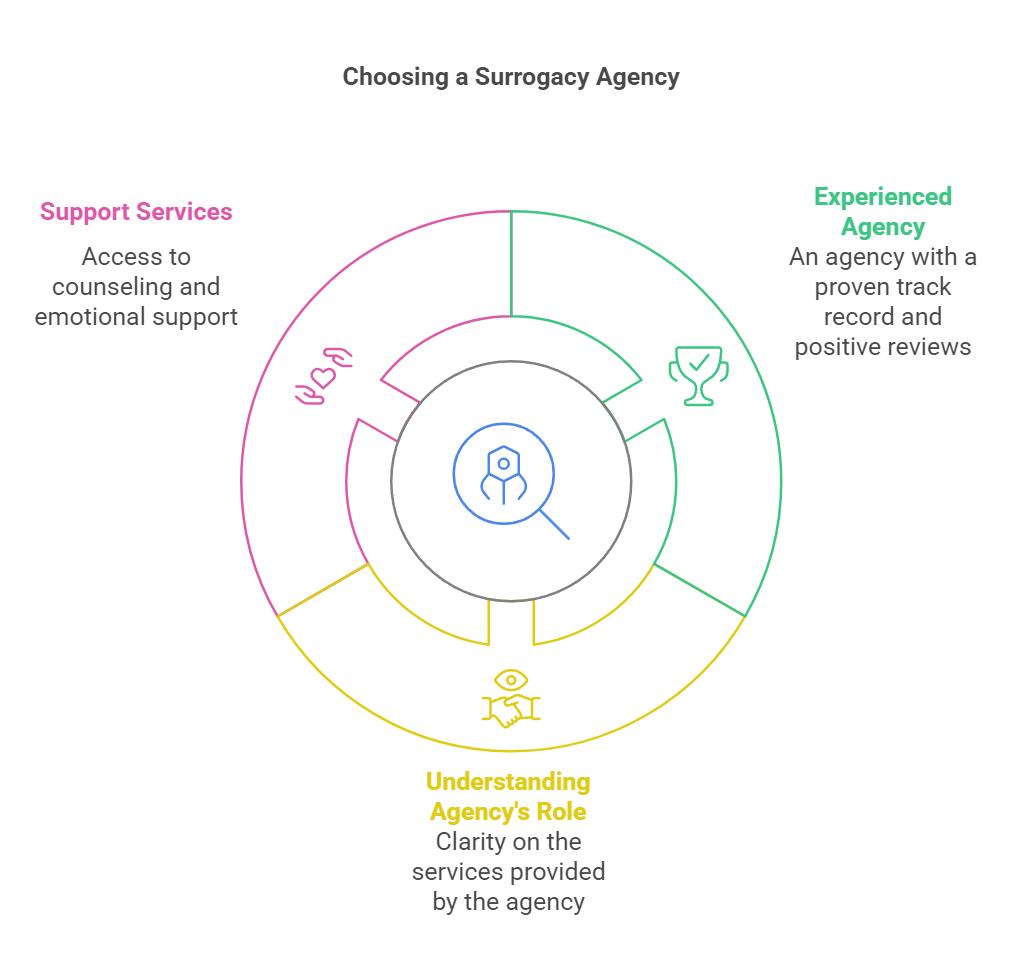
3. Build a Strong Relationship with Your Surrogate
Establishing a positive and open relationship with your surrogate is crucial for a successful surrogacy experience. Clear communication and mutual respect will lay the foundation for a positive collaboration throughout the process.
What to Do:
- Respect Boundaries and Communication Preferences: Discuss with your surrogate how much contact you both feel comfortable with during the pregnancy. Some intended parents and surrogates prefer regular updates, while others may opt for less frequent communication. Understand each other’s preferences to avoid misunderstandings.
- Offer Emotional Support: Pregnancy can be challenging for surrogates, both physically and emotionally. Be compassionate and supportive throughout the process. While you may not be physically carrying the child, your emotional presence and reassurance can be deeply meaningful.
- Participate in Milestones: While surrogates will carry out most of the day-to-day aspects of the pregnancy, it’s important to remain involved. Attend doctor’s appointments, ultrasounds, and other important milestones to build a connection with the surrogate and the baby. These experiences will be important for you as you bond with your child.

4. Prepare for the Legal Aspects of Surrogacy
The legal aspects of surrogacy are one of the most crucial components of the process, as they will protect both you and the surrogate. A strong, legally binding contract is essential for ensuring everyone’s rights are respected.
What to Do:
- Hire a Surrogacy Lawyer: Consult with a lawyer who specializes in reproductive law to draft a comprehensive surrogacy contract. The contract should cover details such as parental rights, medical expenses, compensation for the surrogate, and the responsibilities of all parties involved.
- Understand Parental Rights: Depending on the jurisdiction, you may need to obtain a pre-birth order to legally establish your parental rights before the baby is born. Work with your lawyer to ensure this process is in place.
- Be Aware of State Laws: Surrogacy laws can vary widely depending on where you live. It’s essential to understand how surrogacy is regulated in your state or country and ensure that you are compliant with all local regulations.

5. Financial Planning and Budgeting
Surrogacy is a significant financial commitment, and it’s important to be prepared for the costs involved. These costs can vary depending on the complexity of the arrangement, the agency you choose, the location, and whether you are using a donor for eggs or sperm.
What to Do:
- Understand All Costs: Surrogacy costs can include compensation for the surrogate, medical expenses, agency fees, legal fees, and insurance costs. Make sure to get a detailed breakdown of expected costs, including any potential additional fees if complications arise.
- Create a Budget: Set aside a budget to cover the full range of expenses associated with the surrogacy process. Keep in mind that you may need to account for unforeseen circumstances or multiple cycles of IVF.
- Explore Payment Plans and Insurance: Some agencies offer payment plans for surrogacy costs, and certain insurance policies may cover aspects of surrogacy. It’s important to explore your options to ensure you can comfortably manage the financial aspects.

6. Emotional Preparation for Parenthood
While the surrogacy journey is a medical and logistical process, it is also an emotional one. As intended parents, you will experience a range of emotions throughout the process, from excitement and hope to uncertainty and anxiety. Emotional readiness is essential for maintaining a positive outlook.
What to Do:
- Acknowledge Your Emotions: Recognize that the surrogacy journey can be an emotional rollercoaster. There may be moments of excitement, joy, and gratitude, but there may also be moments of frustration, worry, or disappointment. It’s normal to experience a wide range of emotions, so don’t be afraid to seek support when you need it.
- Seek Counseling or Support Groups: Consider joining a support group for intended parents, where you can connect with others who are going through similar experiences. You may also want to work with a counselor or therapist who specializes in reproductive issues to help you process the emotions that arise during the journey.
- Prepare for the Waiting Period: The surrogacy process can take time—sometimes months or even years—before you finally bring your child home. Managing your expectations and preparing for the waiting period can help you cope with the uncertainties that arise during the process.
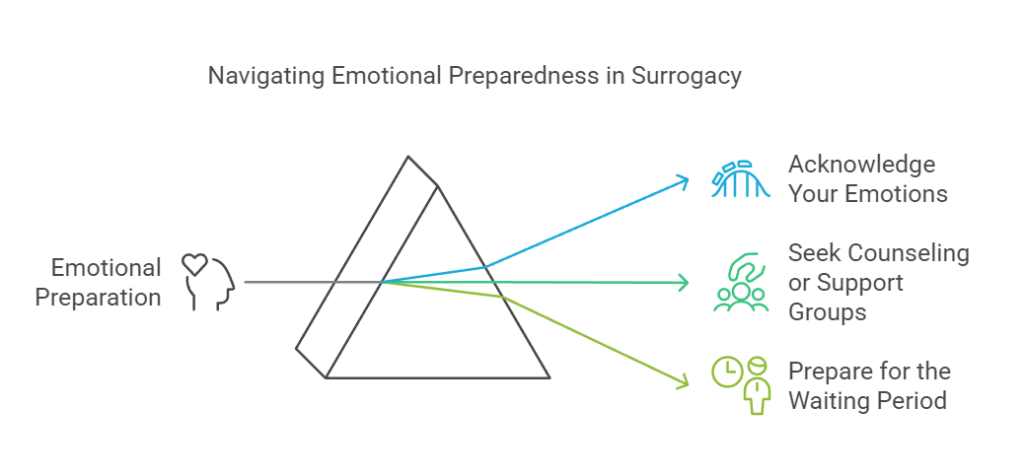
7. Plan for Life After Birth
Once your baby is born, the journey of parenthood is just beginning. While the surrogate will carry the child to term, you will be responsible for the baby’s care once they are born. It’s important to plan for this transition to ensure a smooth and joyful experience.
What to Do:
- Make Arrangements for the Birth: Coordinate with your surrogate, the medical team, and the legal team to ensure that all necessary steps are in place for the birth. This includes establishing your parental rights, preparing for hospital procedures, and ensuring that the birth plan aligns with your wishes.
- Prepare Your Home: Just like any expectant parents, you’ll need to prepare your home for your newborn. This includes creating a nursery, purchasing baby essentials, and making sure your home is safe for a child.
- Establish Post-Birth Legal Steps: Once the baby is born, there may be legal steps to finalize parental rights, such as obtaining a birth certificate with your names on it. Work with your attorney to make sure the legal process is seamless.
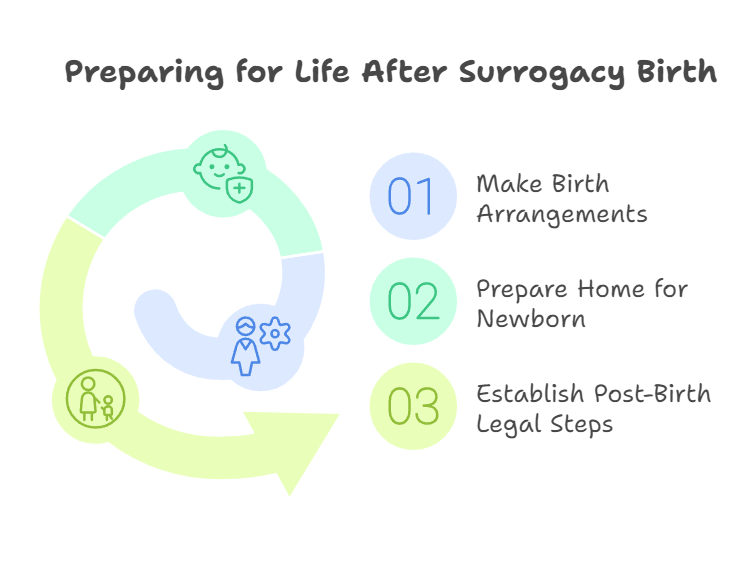
8. Stay Flexible and Patient
The surrogacy journey is full of surprises, and things may not always go according to plan. Whether it’s medical challenges, emotional hurdles, or logistical delays, it’s important to remain flexible and patient throughout the process.
What to Do:
- Adapt to Changing Circumstances: The journey to parenthood can be unpredictable, so try to remain adaptable in the face of unexpected challenges. Your fertility clinic, lawyer, and agency will be there to help you through any changes.
- Stay Positive and Focus on the Goal: Focus on your ultimate goal—becoming parents. Even though surrogacy can be stressful, remember that the end result is worth the effort.
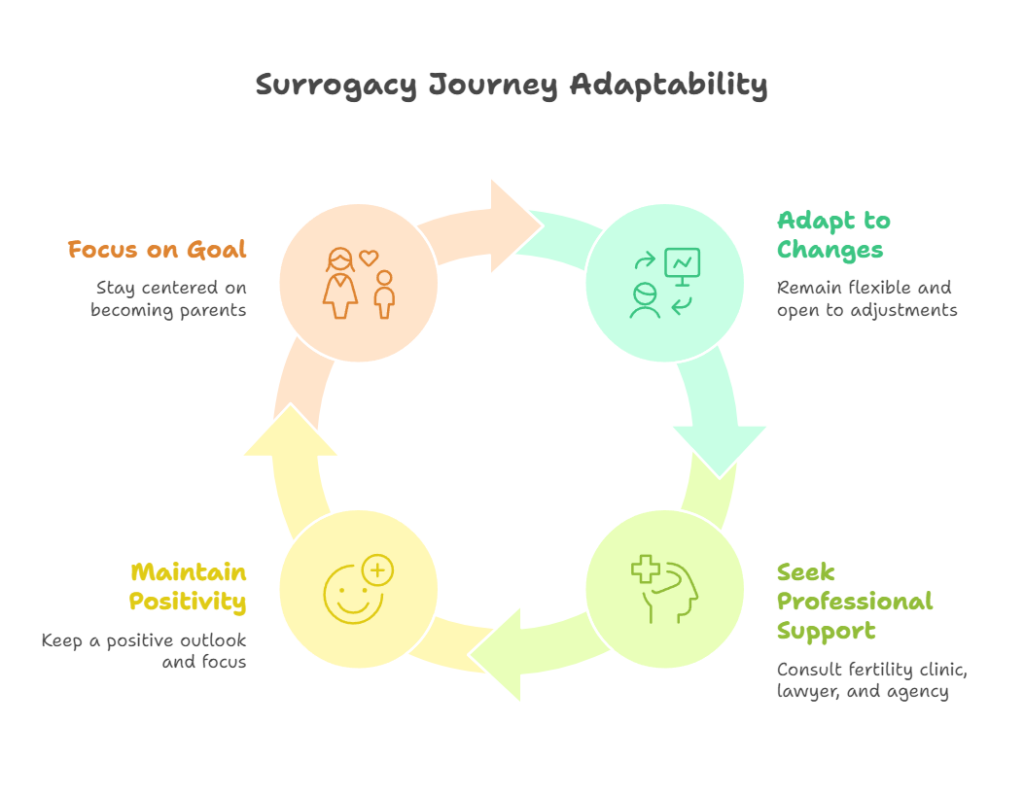
Conclusion
Becoming a parent through surrogacy is a unique and rewarding experience, but it requires careful preparation and attention to detail. By educating yourself about the process, selecting the right agency and professionals, building a strong relationship with your surrogate, and staying financially and emotionally prepared, you can set yourself up for a successful surrogacy journey. Stay patient, flexible, and focused on your goal, and remember that, while the road may be challenging at times, the joy of becoming parents will make it all worthwhile.




